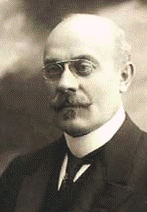Joachim Andersen

Carl Joachim Andersen (April 29, 1847 – May 7, 1909) was a Danish flutist, conductor and composer born in Copenhagen, son of the flutist Christian Joachim Andersen. Both as a virtuoso and as composer of flute music, he is considered one of the best of his time. He was considered to be a tough leader and teacher and demanded as such a lot from his orchestras but through that style he reached a high level.
Biography
As well as his little brother, Viggo was taught by his father and already as a child he performed with success at a Danish theater called Casino accompanied by the little harpist Frantz Pønitz. From when he was 13 years old to the year of 1868 he was first flutist in a musical orchestra in Copenhagen conducted by Niels Gade.
In 1869 he became employed by the Royal Danish Orchestra as a flutist but resigned after a year of leave in 1878. He was longing for larger challenges and went abroad. First stop was Saint Petersburg (1878-1880) where he was engaged by St. Petersburg Philharmonic Orchestra. Afterwards in 1881 he went to Berlin where he was engaged in Bilse's Band as a solo flutist as well as he was in the Royal German Opera.
In 1882 he was a co-founder of the Berlin Philharmonic, which he and 53 other musicians formed out of the former Bilse's Band. Along with his job as a solo flutist, he took over more and more conductor's assignments and conducted over 8 summers one of the orchestra's two daily concerts in Scheveningen.
In 1893 Andersen was forced to resign his job because of a paralysation in his tongue and travelled then back to Copenhagen where he was employed as a composer. Among other pieces he was the composer of concerts in Tivoli Gardens. In 1897 he founded an orchestra school and was, until his death, leader and professor in conducting at the school. In 1905 he was knighted by king "Christian IX of Denmark" to the "Order of the Dannebrog ".
Works
 |
Caprice No.1 Op.15
Performed by David Hernando Caprice No.24 Op.15
Performed by David Hernando Caprice No.3 Op.15
Performed by David Hernando |
| Problems playing these files? See media help. | |
His compositions are almost exclusively for the flute. His 8 volumes of etudes for flutists of the highest level are considered his largest success. They are still used all over the world when one wants to be a top professional.
His complete works consist of 67 opuses which are mainly for the flute including solo pieces and piano accompanied pieces. The Christian X's Honour March that was composed to the then crown prince reached popularity.
List of works
The following list is incomplete.
- op.2 - Hungarian Fantasie (Ungarsk fantasi)
- op.3 - Concert piece (Koncertstykke)
- op.5 - Ballade and dance of the sylphs (Ballade et danse des Sylphes)
- op.6 - Salon Piece (Morceaux de Salon)
- op.7 - Impromptu
- op.8 - Moto perpetuo
- op.9 - At the river shore (Au Bord de la Mer)
- op.10 - Tarantella
- op.15 - Etudes for flute (Fløjteetuder)
- op.16 - Characteristic Fantasy (Fantaisie Caractéristique)
- op.19 - Album sheet (Album-Blatt)
- op.21 - Etudes for flute (Fløjteetuder)
- op.22 - The resignation and polonaise (La Resignation et Polonaise)
- op.24 - Six salon pieces in two suites (Six Morceaux de Salon, en deux Suites)
- op.26 - Variations Drolatiques
- op.27 - Elegy variations (Variations Elegiaques)
- op.28 - Two pieces (Deux Morceaux)
- op.30 - Etudes for flute (Fløjteetuder)
- op.33 - Etudes for flute (Fløjteetuder)
- op.35 - Wien Neerlands Bloed
- op.37 - Etudes for flute (Fløjteetuder)
- op.41 - Etudes for flute (Fløjteetuder)
- op.44 - L'Hirondelle
- op.45 - Opera transcriptions (Operatranskriptioner)
- op.46 - Reunion (Wiedersehen)
- op.47 - Solo performance for young flutists (Solovortrag für junge Flötenspieler)
- op.48 - Allegro Militaire
- op.49 - Devils Polka (Pirun Polska)
- op.50 - 6 Swedish polkas (6 Svenske polsker)
- op.51 - Four salon pieces (Quatre Morceaux de Salon)
- op.52 - Salon pieces, part 1 + 2 (Salonstücke Heft 1 + 2)
- op.53 - Canzone + Memory (Canzone + Erinnerung)
- op.54 - Deuxième Impromptu
- op.55 - Eight Performer Pieces (Acht Vortragsstücke)
- op.56 - Five easy pieces (Fünf leichtere Stücke)
- op.57 - Three pieces (Trois Morceaux)
- op.58 - Introduction et caprice sur des aires hongroises, for flute and orchestra or flute and piano
- op.59 - National Fantasies (Fantasies Nationales)
- op.60 - Etudes for flute (Fløjteetuder)
- op.61 - Second concert piece (Deuxième Morceaux de Concert)
- op.62 - Ten pieces (Dix morceaux)
- op.63 - 24 Technical Etudes (24 Etudes Techniques)
- op.67 - Etudes for flute (Fløjteetuder)
List over pieces (not opuses)
- Dances
- Marches
- Some mood pieces
- Christian X's Honour March (Christian d. 10.'s honnørmarch)
- Silver Myrtles (piano)
- Sølvmyrter Vals (piano)
- Slaraffia-Polka-Mazurka (piano)
Media
 |
Étude 4 for Solo Flute
Performed by Scott Goff |
| Problems playing this file? See media help. | |
External links
- Free scores by Joachim Andersen at the International Music Score Library Project (IMSLP)
- Overview of Andersen's compositions in the royal Danish library, with pdf's of most of the music
the mp3 file "étude for solo flute by scott goff" is op.15 n.3 of the composer joachim andersen (the piece is this )
| Wikimedia Commons has media related to Joachim Andersen. |